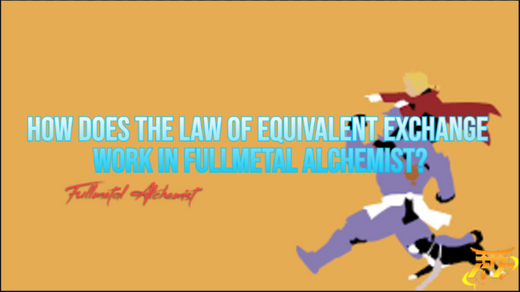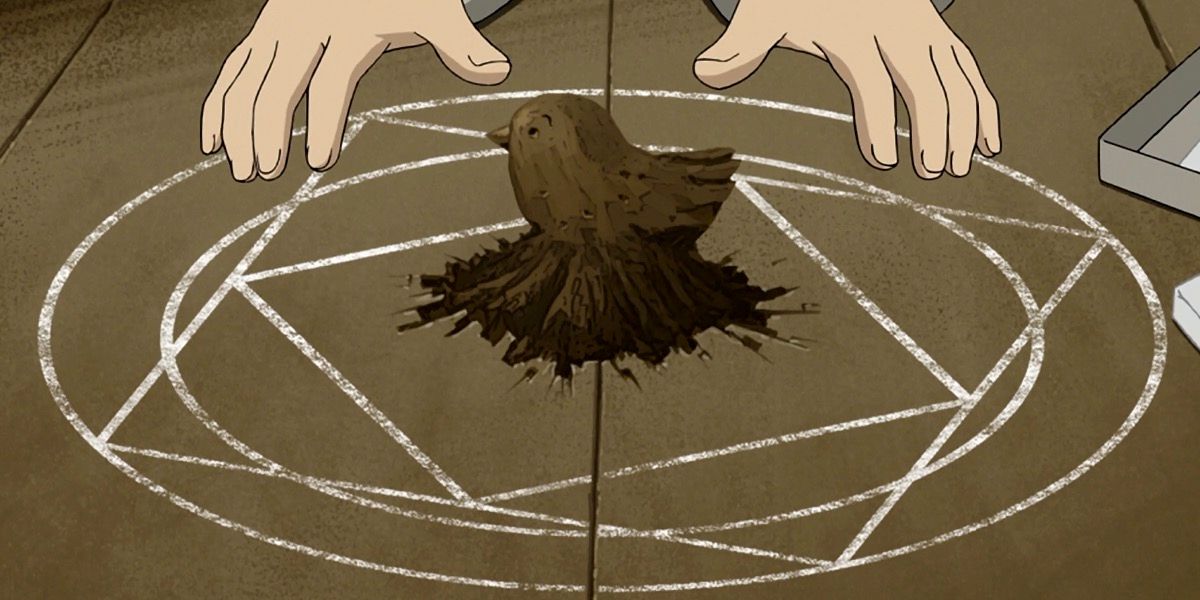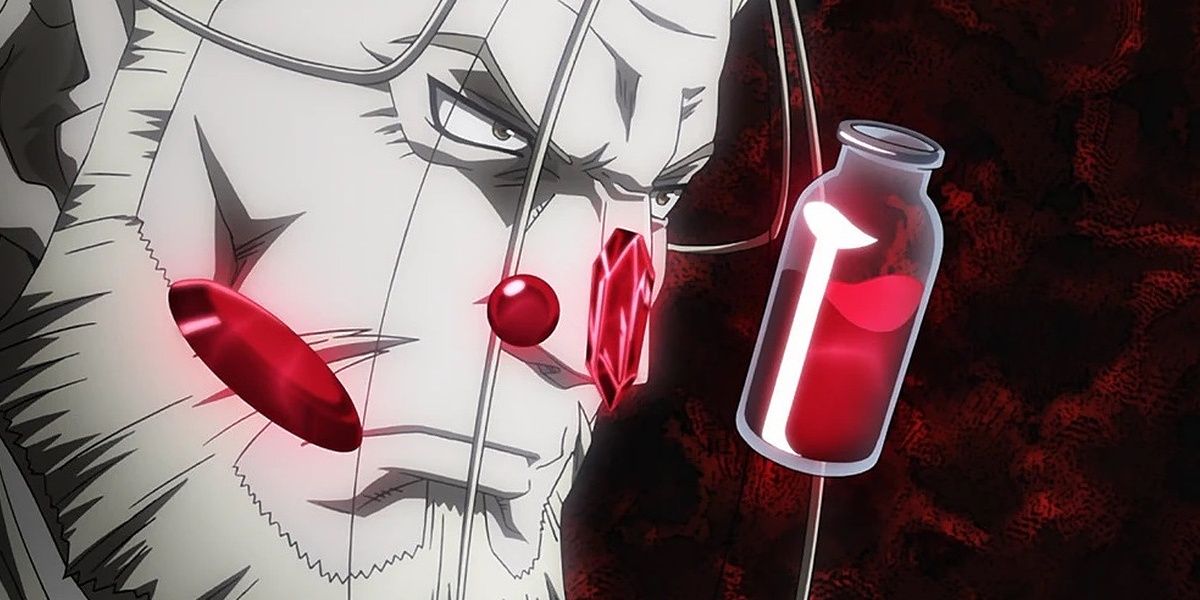
How does the law of equivalent exchange work in Fullmetal Alchemist?
Share
The law of equivalent exchange governs the use of alchemy in Fullmetal Alchemist, and its rules bring consequences.
In Fullmetal Alchemist: Brotherhood, alchemy is at the pinnacle of science. It allows its practitioners to alter the composition of matter through the process of transmutation, a skill useful both in combat and everyday life. Despite its numerous applications, alchemy is a science, and as such, it is bound by the laws of the FMA universe.
That said, the fundamental principle of alchemy revolves around the law of equivalent exchange. While it may seem complex, the simple concept is absolute: you cannot create something from nothing. To create something, you must exchange something of equal value, and that thing is then lost. The law of equivalent exchange limits alchemy’s infinite potential, and the series explores why this is, in fact, a good thing.
Before starting, you can now find all our anime figures from Australia by clicking here:
The law of equivalent exchange in Fullmetal Alchemist limits alchemy.

The law of equivalent exchange in Fullmetal Alchemist is a fictional version of the first law of thermodynamics, which states that energy cannot be created or destroyed, only transformed. For instance, light can transform into heat, electricity into sound, and so on. In Fullmetal Alchemist, Equivalent Exchange is based on two fundamental principles: the Law of Conservation of Mass and the Law of Natural Providence.
The Law of Conservation of Mass states that an object cannot be created from nothing, and if it is broken down, it will be reduced to components that sum up to the same mass. For example, an object with a mass of one gram can only be transmuted into another object that also weighs one gram. If an object weighing one gram is broken down, the process will yield components that sum to the same weight.
The Law of Natural Providence states that objects made from a particular material or element can only be transmuted into objects of similar composition. For example, objects made from stone can be transmuted into other objects made from stone, but not into objects primarily composed of water. In other words, lead cannot turn into gold. However, there are a few notable exceptions to this rule.
| Discover our Edward & Alphonse Elric figure |
The three fundamental laws of alchemy are
- Do not transmute gold
- Do not act against the government
- Do not attempt human transmutation
The Taboo of Alchemy : human transmutation, rebound and truth

Alchemy, though capable of performing miraculous feats, is not without limits. Reviving the dead through the process of human transmutation is impossible and is considered taboo in the world of alchemy. In order to bring back someone who has died, both their soul and their original body must be transmuted. Alphonse Elric states that a wandering soul can only return to its original body, and vice versa. That’s why his soul begins to reject the armor—it’s not its true vessel.
Fullmetal Alchemist establishes that the value of a human soul cannot be quantified, and since something cannot be created without losing an equivalent object, something of infinite value can never be exchanged equally. This doesn’t stop alchemists from trying, as sometimes the pain of losing a loved one outweighs logic. When a human transmutation is performed, the alchemist responsible pays a heavy price, because exchanging a soul of infinite value for finite materials disrupts the alchemical equation, causing a rebound.
| Discover our Edward Elric Painting |
The rebound makes the alchemist pay a heavy price in order to restore the balance of the exchange. Alphonse loses his body, and Edward loses a leg while attempting to revive their mother. Additionally, Edward sacrifices an arm when binding Alphonse’s soul to the armor. In a separate instance, Izumi Curtis loses many organs after trying to revive her baby. The cost will always be steep, even if the taboo is committed unintentionally or against one’s will—Roy Mustang loses his sight, despite being forced to perform a human transmutation by his Father and the Homunculi.
The law of equivalent exchange can be circumvented with a Philosopher’s Stone
The punishment for human transmutation is severe, not only because it violates the law of equivalent exchange, but also because challenging this law means that a human has effectively tried to play God—and in Fullmetal Alchemist, God is none other than Truth. Anyone who attempts human transmutation is teleported through their own personal Gate of Truth (which allows alchemy to be performed) and brought before the being whose name the Gate bears. Truth is referred to as God because it holds infinite knowledge, encompassing everything from alchemy, the history of the world, and much more. When one crosses the Gate of Truth, this infinite knowledge is displayed and absorbed by the targeted alchemist. Along with this knowledge, entering the domain of Truth also allows the alchemist to perform alchemy without using a transmutation circle—the fundamental law of equivalent exchange still applies.
How the Philosopher's Stone Intervenes in Human Transmutation
The use of a Philosopher’s Stone is the only way to perform human transmutation without causing a rebound. This is because Philosopher’s Stones are made up of multiple souls, allowing their content to be exchanged equally during human transmutation. However, while technically possible, the morality of this act is highly questionable, as the creation and use of a Philosopher’s Stone are inherently unethical from the start. That’s why Ed and Al openly refuse to exploit a Philosopher’s Stone to overturn the law of equivalent exchange, even if it means achieving their goals instantly.
| Discover our "Flame Alchemist" Mustang figure |
The power of alchemy itself can be exchanged.
The only other example of a successful human transmutation in Fullmetal Alchemist is Edward Elric’s final transmutation, in which he offers his own Gate of Truth and thus his ability to perform alchemy in exchange for the soul and body of Alphonse. Since the values involved are incalculable from the start, whether this truly satisfies the law of equivalent exchange remains open to speculation. However, it is undeniable that at that moment, Edward sacrifices absolute power something with infinite value to save his brother.
Truth is an omniscient being, as well as the mirror reflection of the alchemist standing before it. As such, it can discern what that person holds most precious. For Edward, alchemy is what defines him and unquestionably his most valuable possession. His willingness to sacrifice what means the most to him was more than enough to satisfy Truth, thus fulfilling the Law of Equivalent Exchange.
Our store offers all kinds of figures and merchandise related to anime, with all our products faithfully adapted from the respective animes.
You’ll find Figures, LED Lights, iPhone Cases, AirPods Cases, as well as Apparel and Goodies featuring your favorite characters.
The characters available in our online store are from the most popular animes, such as One Piece, Naruto, Demon Slayer, Dragon Ball Z, Jujutsu Kaisen, and more.
The anime-themed products we offer are not just gifts. You can use them personally to decorate your room or fill your collector’s shelf like a true Otaku!
So, don’t hesitate to visit our online store by clicking here!








